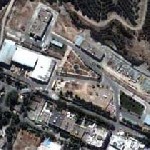 Google News
Google News - Tehran -- Reacting defiantly to a U.N. Security Council resolution imposing sanctions on its nuclear program, Iran vowed Sunday to continue efforts to enrich uranium and warned that the action would change Iran's relationship with the world body's nuclear monitoring agency.
The Security Council voted unanimously Saturday to impose sanctions on Iran, banning the import and export of materials and technology used in uranium enrichment, reprocessing and ballistic missiles.
President Mahmoud Ahmadinejad said Sunday that the sanctions would not prevent Iran from developing its nuclear program, ISNA news agency reported.
"The nuclear technology is our right, and no one can take it away from us," Ahmadinejad was quoted as saying.
"You will soon regret this superficial action," he said, referring to the sanctions.
"What kind of Security Council is this that is completely in the hands of the Zionists, the United States and Britain?" he added.
Iran's chief nuclear negotiator, Ali Larijani, said Iran would respond immediately to the vote by pushing forward with its plan to develop its nuclear program, the newspaper Keyhan reported Sunday.
"Beginning Sunday morning, we will begin activities at Natanz -- site of 3,000 centrifuges -- and we will drive with full speed," he was quoted as saying. "This will be our immediate response to the resolution."
The Foreign Ministry said in a statement that Iran, in response to the sanctions, intends to put into operation an additional 3,000 centrifuges at its main nuclear complex in Natanz, the newspaper Iran reported Sunday. It had said it would have 3,000 in operation by the end of the month.
Progress at Natanz has been slow, though. Iran has sporadically operated only a single "cascade" of 164 centrifuges, the devices that spin at high speed and turn ordinary uranium into a fuel usable for nuclear power plants -- or, at higher enrichment levels, nuclear weapons.
Members of parliament agreed Sunday to discuss a bill that would require the government "to review its cooperation" with the International Atomic Energy Agency, the U.N. monitoring agency. It was not clear what the bill would require. The deputy speaker of parliament, Mohammad Reza Bahonar, refused to comment when asked whether it might require that Iran withdraw from the international Nuclear Non-Proliferation Treaty.
"Our efforts should be reasonable and moderate," he told ISNA. "That means we should be after getting our rights and also show that we are not after a fight. And if they are willing to recognize our rights, we will cooperate."
Iran says that its program is peaceful and that as a signatory of the treaty, it has the legal right to enrich uranium.
It says it wants to enrich uranium to produce fuel for its nuclear reactors independently. However, enriched uranium can be used for making nuclear weapons if it is enriched to higher levels.
The United States says that Iran is a major oil exporter and that its nuclear program is a cover for its weapons program.
The Security Council on Saturday required Mohamed ElBaradei, director of the nuclear monitoring agency, to report to the council within 60 days on whether Iran has complied and suspended its enrichment program. The council warned that it would take "further appropriate measures" if Iran refused to comply.
But there were no hints Sunday by Iranian authorities that Iran might halt the program.
"Our response to the resolution is the continuation of peaceful nuclear activities in a more concrete, decisive and more organized manner than before," said the Foreign Ministry spokesman, Mohammad Ali Hosseini, during his weekly news conference.
Larijani also told Keyhan that pressure from the West through the Security Council would not work. "It will make us more determined to reach our nuclear goals," he said.
